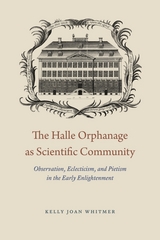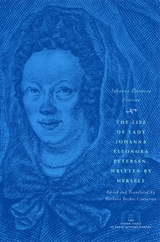2 books about Pietism

The Halle Orphanage as Scientific Community
Observation, Eclecticism, and Pietism in the Early Enlightenment
Kelly Joan Whitmer
University of Chicago Press, 2015
Founded around 1700 by a group of German Lutherans known as Pietists, the Halle Orphanage became the institutional headquarters of a universal seminar that still stands largely intact today. It was the base of an educational, charitable, and scientific community and consisted of an elite school for the sons of noblemen; schools for the sons of artisans, soldiers, and preachers; a hospital; an apothecary; a bookshop; a botanical garden; and a cabinet of curiosity containing architectural models, naturalia, and scientific instruments. Yet, its reputation as a Pietist enclave inhabited largely by young people has prevented the organization from being taken seriously as a kind of scientific academy—even though, Kelly Joan Whitmer shows, this is precisely what it was.
The Halle Orphanage as Scientific Community calls into question a long-standing tendency to view German Pietists as anti-science and anti-Enlightenment, arguing that these tendencies have drawn attention away from what was actually going on inside the orphanage. Whitmer shows how the orphanage’s identity as a scientific community hinged on its promotion of philosophical eclecticism as a tool for assimilating perspectives and observations and working to perfect one’s abilities to observe methodically. Because of the link between eclecticism and observation, Whitmer reveals, those teaching and training in Halle’s Orphanage contributed to the transformation of scientific observation and its related activities in this period.
The Halle Orphanage as Scientific Community calls into question a long-standing tendency to view German Pietists as anti-science and anti-Enlightenment, arguing that these tendencies have drawn attention away from what was actually going on inside the orphanage. Whitmer shows how the orphanage’s identity as a scientific community hinged on its promotion of philosophical eclecticism as a tool for assimilating perspectives and observations and working to perfect one’s abilities to observe methodically. Because of the link between eclecticism and observation, Whitmer reveals, those teaching and training in Halle’s Orphanage contributed to the transformation of scientific observation and its related activities in this period.
[more]

The Life of Lady Johanna Eleonora Petersen, Written by Herself
Pietism and Women's Autobiography in Seventeenth-Century Germany
Johanna Eleonora Petersen
University of Chicago Press, 2005
In a time when the Pauline dictum decreed that women be silent in matters of the Church, Johanna Eleonora Petersen (1644–1724) was a pioneering author of religious books, insisting on her right to speak out as a believer above her male counterparts. Publishing her readings of the Gospels and the Book of Revelation as well as her thoughts on theology in general, Petersen and her writings created controversy, especially in orthodox circles, and she became a voice for the radical Pietists—those most at odds with Lutheran ministers and their teachings. But she defended her lay religious calling and ultimately printed fourteen original works, including her autobiography, the first of its kind written by a woman in Germany—all in an age in which most women were unable to read or write.
Collected in The Life of Lady Johanna Eleonora Petersen are Petersen's autobiography and two shorter tracts that would become models of Pietistic devotional writing. A record of the status and contribution of women in the early Protestant church, this collection will be indispensable reading for scholars of seventeenth-century German religious and social history.
Collected in The Life of Lady Johanna Eleonora Petersen are Petersen's autobiography and two shorter tracts that would become models of Pietistic devotional writing. A record of the status and contribution of women in the early Protestant church, this collection will be indispensable reading for scholars of seventeenth-century German religious and social history.
[more]
READERS
Browse our collection.
PUBLISHERS
See BiblioVault's publisher services.
STUDENT SERVICES
Files for college accessibility offices.
UChicago Accessibility Resources
home | accessibility | search | about | contact us
BiblioVault ® 2001 - 2024
The University of Chicago Press









